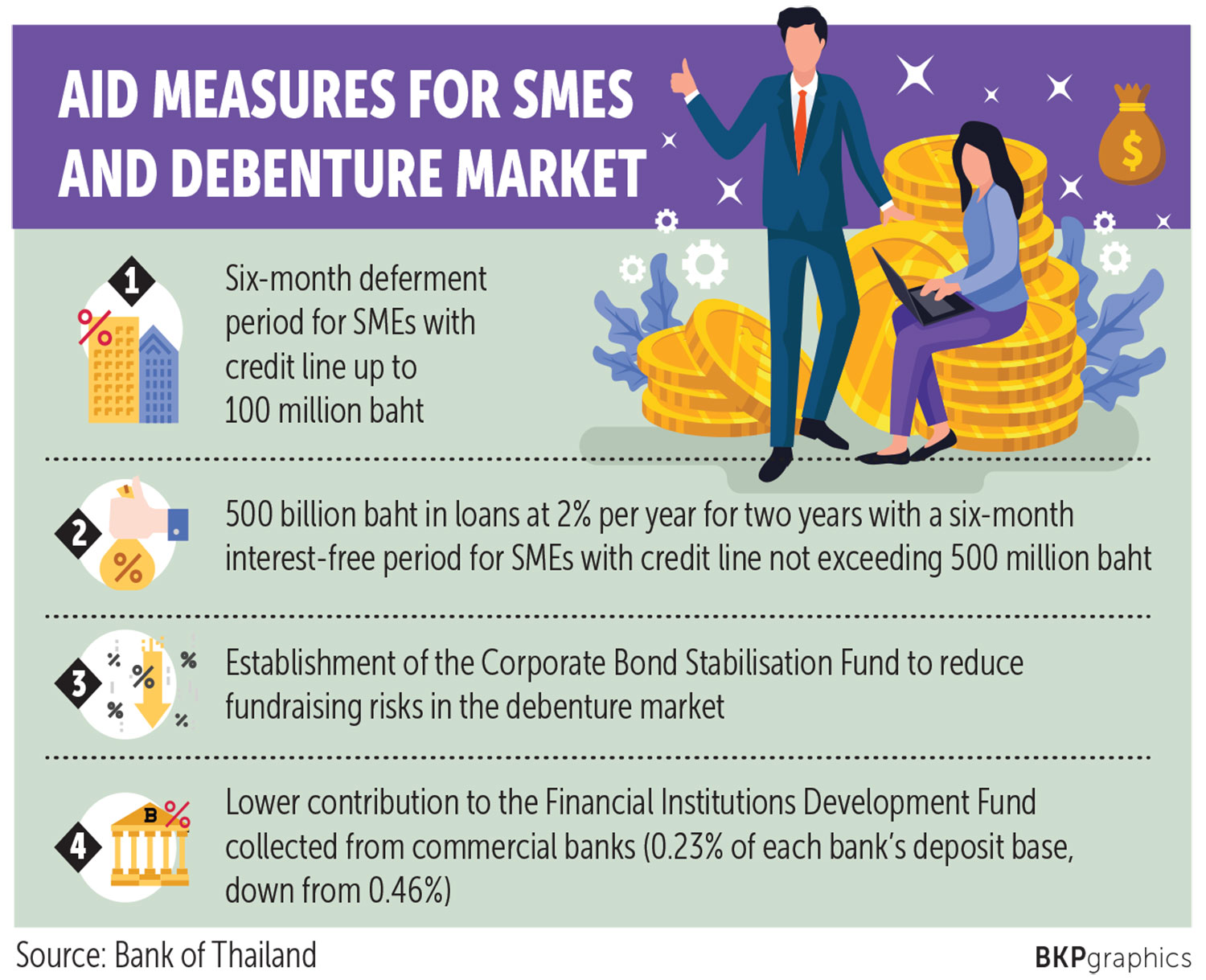Thailand: BoT schemes to cover 1.7m SMEs
About 1.7 million small and medium-sized enterprises (SMEs) with total loans outstanding of 2.4 trillion baht are eligible to participate in the Bank of Thailand’s six-month deferment period on principal and interest and a 500-billion-baht soft loan scheme, says the central bank’s chief.
Another measure is the Corporate Bond Stabilisation Fund (BSF), a pre-emptive strike to prevent the impact of the coronavirus pandemic from affecting financial stability, said governor Veerathai Santiprabhob.
The three measures are among four in total under the third phase of the central bank’s relief measures worth 900 billion baht approved by the cabinet yesterday, targeting SMEs and corporate bond issuers.
The third phase will come into effect after two royal decrees related to the issues are enacted.
Under the third package, all SMEs with a credit line of up to 100 million baht will be automatically offered the six-month grace period on principal and interest to alleviate impacts on small and mid-scale SMEs, which are an important source of employment, Mr Veerathai said.
SMEs unscathed by the pandemic are advised to continue servicing debt as usual to allow lenders to retain higher liquidity to help those who are in need.
“The Bank of Thailand hopes that this measure will provide some relief such that SMEs will have more cash on hand to support their businesses and meet necessary expenses, especially wages,” Mr Veerathai said.
The central bank will provide 500 billion baht in soft loans at 0.01% annual interest to financial institutions for two years to relend to SMEs with a maximum credit line of 500 million baht at 2% interest.
The government will absorb interest cost for six months for SMEs who receive soft loans.
SMEs that are eligible for the measure must operate domestically, must not be listed on the Stock Exchange of Thailand or the Market for Alternative Investment, must have a credit line with a financial institution not exceeding 500 million baht, and must have been servicing debt or making late payments of less than 90 days as of the end of 2019.
The maximum drawdown for the soft loans is 20% of banks’ loans outstanding as of the end of December.
Moreover, the government will partly compensate financial institutions for losses that might be incurred on these additional new loans.
In the event that these loans turn non-performing by the end of the second year, financial institutions will be compensated no more than 70% of the additional loans for borrowers with a credit line not exceeding 50 million baht, and no more than 60% of the additional loans for borrowers with a credit line of 50–500 million baht.
Amid risks that many corporations will experience a liquidity shortage, the central bank agreed to set up the 400-billion-baht BSF to provide bridge financing to high-quality firms with bonds maturing during 2020-21.
Mr Veerathai said corporate bonds’ total size is significant, so the central bank must have precautionary measures to ensure that the market will function normally.
He said the scheme does not cover non-investment-grade bonds, as these instruments are favoured by high-net-worth investors who are more sophisticated.
The total outstanding of the Thai corporate bond market amounts to 3.6 trillion baht or more than 20% of the country’s GDP.
According to TMB Analytics, investment-grade corporate bonds are maturing to the tune of 433 billion baht this year, while non-investment-grade bonds worth 110.6 billion baht are to be redeemed in 2020.
To be eligible for the BSF, corporate bond issuers must have raised the majority of their funding needs through other means such as bank loans or capital increase, have a clear long-term financing plan, and meet other conditions as set out by the BSF’s investment committee later.
For the final measures, the central bank will halve the rate that financial institutions must contribute to the Financial Institutions Development Fund from 0.46% of deposit base to 0.23% for two years to encourage financial institutions to immediately pass on such cost savings to businesses and households by further reducing their loan rates.
Mr Veerathai gave assurances that foreign reserves would not be used to finance the 900-billion-baht package, as the central bank has other mechanisms.
“We are ready to launch additional measures if needed,” he said.
Vachira Arromdee, an assistant governor, said the BSF is an unprecedented mechanism that lets the central bank directly buy corporate bonds and is a pre-emptive measure to curb bond market risks.
Meanwhile, deputy governor Ronadol Numnonda said 997,768 individual and SME debtors with total borrowing of 993 million baht had joined the first two batches of the central bank’s relief measures as of April 3.
Source: https://www.bangkokpost.com/business/1895165/bot-schemes-to-cover-1-7m-smes


 Thailand
Thailand




